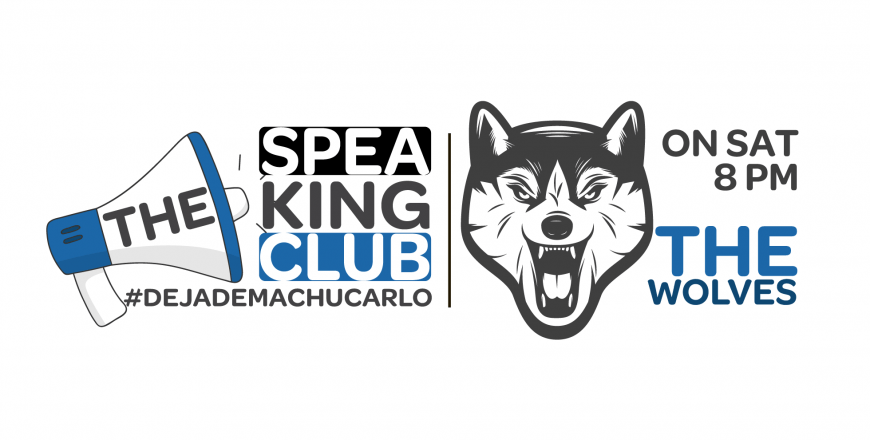The Speaking Club – PRES

The Speaking Club, this one named The Wolves.
What is the Speaking Club? It is an encounter where you can practice your English skills with others by using prior knowledge you have and getting together to practice. We gather for an hour a week online and from time to time in person.
Wolves are complex, highly intelligent animals who are caring, playful, and above all devoted to family.
They educate their young, take care of their injured and live in family groups. Now that you know that, we hope you feel that way about your English Skills.
In this Conversational environment, we will focus on pushing your Speaking skills to the limit by having you engage with others in a friendly, bullying-free surrounding, using the Communicative Approach to ensure you exploit those skills in each encounter.
July - Week 2
Fake news is the spread of false or misleading information via social media, word by word or so. It is intended to damage the reputation of one.
What is fake news? How do they affect us? Are they intended?
Here you have a list of the top 10 most common fake news vocabulary.
You will change the way you use any form of media after you hear this. Why? Because you are the media. Yes, you are responsible for everything you see online, in print, and on TV... even so-called fake news. Video by Christina Nicholson
July - Week 3
See how Prince Ea offers an apology letter to future generations in terms of environmental issues.
This video describes environmental problems and possible solutions. The causes and effects of global are described with an easy-to-understand diagram of the greenhouse effect.
As the human population continues to grow, so does our impact on the environment. In fact, recent research has shown that three-quarters of Earth’s land surface is under pressure from human activity. In this short film, spoken word artist Prince Ea makes a powerful case for protecting the planet and challenges the human race to create a sustainable future. Winner of the Film4Climate competition organized by the Connect4Climate Program of the World Bank (film4climate.net).
Our planet’s diverse, thriving ecosystems may seem like permanent fixtures, but they’re actually vulnerable to collapse. Jungles can become deserts, and reefs can become lifeless rocks. What makes one ecosystem strong and another weak in the face of change? Kim Preshoff details why the answer, to a large extent, is biodiversity.
Breton Lorway examines the effects of American Consumerism on the environment. Being from a small woodsy town, she’s grown up learning to love the earth.
Rainforests are home to over half of the world's plant and animal species. Learn about tropical and temperate rainforests, how they contribute to the global ecosystem, and the conservation efforts being done to protect these biomes.
What causes climate change (also known as global warming)? And what are the effects of climate change? Learn the human impact and consequences of climate change for the environment, and our lives.
What is air pollution? Learn how greenhouse gasses, smog, and toxic pollutants effect climate change, and human health.
Oceans serve as the planet’s largest habitat and also help to regulate the global climate. But why is the ocean salty? And how is climate change impacting the ocean?
Forests cover about 30% of the planet, but deforestation is clearing these essential habitats on a massive scale. What is deforestation? Find out the causes, effects, and solutions to deforestation.
Far above Earth's surface, the ozone layer helps to protect life from harmful ultraviolet radiation. Learn what CFCs are, how they have contributed to the ozone hole, and how the 1989 Montreal Protocol sought to put an end to ozone depletion
Learn these phrases in context and observe their examples in order to define the environment properly.
Avocado Rise is a non-profit collaborative documentary reporting on the growing environmental problems in the Sierra de Bahoruco. Sierra de Bahoruco, located in the Dominican Republic and classified as a Biosphere Reserve by UNESCO, is under attack as a result of rising global avocado demand.
July - Week 4
Manners matter more than you think
How to be polite and why some manners. Meaning of manners for kids.
You must learn about English culture and etiquette too when learning English.
These are the things you should not do or say in America and probably at other places as well.
After going around London to spread awareness about manners, I wanted to take people's opinions on my topic, are manners important?
Take a look at this list of words.
August - Wee 1
Have you ever thought about how lucky we all are? We live in a blessed time where the shelves in supermarkets are full of food and everyone, literally everyone can easily find a treat for their taste. Few people know, however, that many famous and popular products hide a lot of secrets.
Learn the name of some foods and drinks in English, with this vocabulary video specially designed for kids and beginners.
How to describe food taste and cooking methods
You’ll see how to talk about different cuisines, talk about food you like – or dislike – and talk about cooking and eating habits.
This video shows you different idiomatic expressions that are related to food.
Take a look at this huge list of terms related to food, cooking, taste, restaurant, and more. Also focused on common food types and conditions.
July - Week 5
In this video you will see 20 things people do that might annoy others. Do you do any of them? Do they annoy you?
Learn how to talk about annoying habits in English. It is going to show you expressions and important words to describe annoying habits in English.
Learn how to say you are annoyed or angry in English using some phrasal verbs and advance vocabulary.
This video shows some common pet peeves that Americans do.
Watch this short about people telling us their pet peeves. Here a hundred people share this really annoying things for them.
We all have pet peeves. It's just part of being alive and on this planet with other human beings. (Hey, people can be annoying sometimes!) And having less-than-tolerant opinions about that doesn't make you a bad person.
Aug - Week 1
In the 3rd millennium BCE, Mesopotamian kings recorded and interpreted their dreams on wax tablets. In the years since we haven't paused in our quest to understand why we dream. And while we still don’t have any definitive answers, we have some theories. Amy Adkins reveals the top seven reasons why we might dream.
Do you remember your dreams? Do you want to control your dreams? We all dream, but each of us dreams differently. In this lesson, you will learn the vocabulary we use to talk about our dreams in English. You'll learn about the different types of dreams that you can have.
Learn English About DREAMS Vocabulary l Dream Vocabulary in English. In this lesson, teacher Sarah teaches English about dreams and how to talk about dreams in English to help improve your English speaking
What are some of the most common nightmares? What are they are trying to tell you? Watch this video to learn about this.
Aug - Week 2
A short explanation of social networking websites and why they are popular. This video introduces the basic ideas behind Social Networking. It focuses on the role of social networking in solving real-world problems.
You use social networks every day, but how can we understand how they work to affect our decisions, our careers, our health, and our histories? The field of Social Network Analysis is the dynamic and highly adaptable group of techniques that let us quantify and understand the complex structures and flows of relationships, thoughts, and things between people around the world
Social technology is simultaneously connecting us and isolating us. It’s affecting everything from our basic social relationships to the way that we work, learn, and experience. Social media should be a support to real relationships, not a catalyst to losing them. Kristin Gallucci speaks to marketers about Marketing with emotion to move brands to align with customers and act with passion.
Scrolling through our social media feeds feels like a harmless part of our daily lives. But is it actually as harmless at seems? According to social media expert Bailey Parnell, our growing and unchecked obsession with social media have unintended long-term consequences on our mental health.
Check these stats about social media. Read how users spend lots of time within more than 6 different social media sites.
Sep - Week 1
Here you have energy vocabulary words.
There are many benefits to using renewable energy resources, but what is it exactly? From solar to wind, find out more about alternative energy, the fastest-growing source of energy in the world—and how we can use it to combat climate change.
Please watch this video to learn about different types of renewable energy.
Much of the world's energy is sourced from fossil fuels. However, there are several individuals and companies who have developed inventions to help get the world off of non-renewable energy. Watch the video above to see these inventions in action.
Learn about energy type
April, week 1 is up an running




